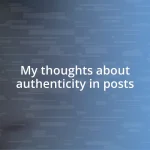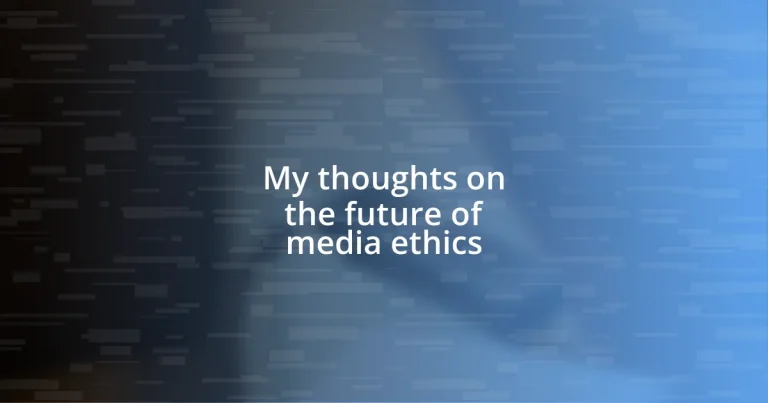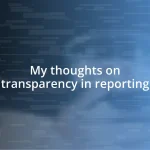Key takeaways:
- The ethical landscape of media is complicated by factors like misinformation, corporate influence, and the pressure for sensationalism, highlighting the need for transparency and accountability.
- Technological advancements, particularly algorithms and social media, pose significant challenges for maintaining accuracy and integrity in journalism.
- Future trends in media ethics will focus on diversity, representation, and addressing conflicts of interest to foster trust and responsible reporting practices.
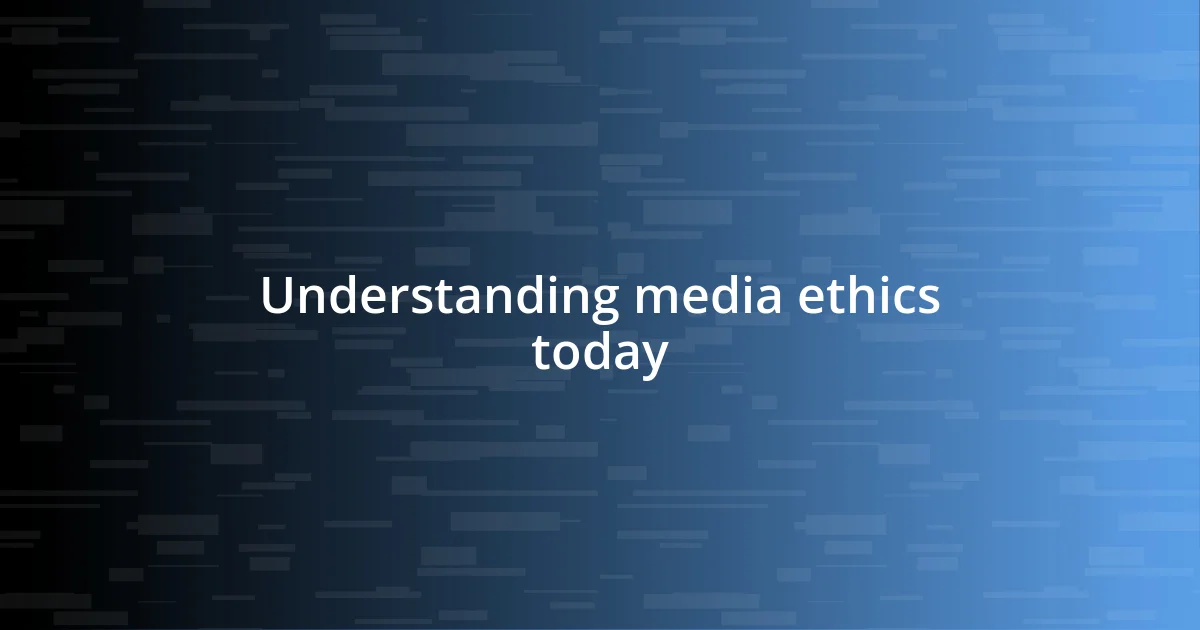
Understanding media ethics today
Understanding media ethics today is like trying to navigate a constantly changing landscape, where the rules often feel ambiguous. I remember a time when I questioned the integrity of a news source; their sensational headlines seemed to overshadow the truth. How do we discern what is ethical when the lines between fact and opinion blur so easily in today’s digital age?
At the heart of media ethics lies a responsibility to the public, but that responsibility can be overwhelmed by the pressure to generate clicks and views. Reflecting on my experiences, I often wonder: Are journalists prioritizing audience engagement over accuracy? This dilemma not only complicates the trust between media outlets and their readers, but it also challenges us to think critically about the information we consume.
Moreover, the rise of social media has transformed how we perceive accountability in the media. I find myself pondering the role of personal biases—do they seep into reporting more today than in the past? With every tweet and post, the stakes feel higher, signaling a pressing need for all of us to understand that media ethics isn’t just about guidelines; it’s about fostering honesty in a world that craves transparency.
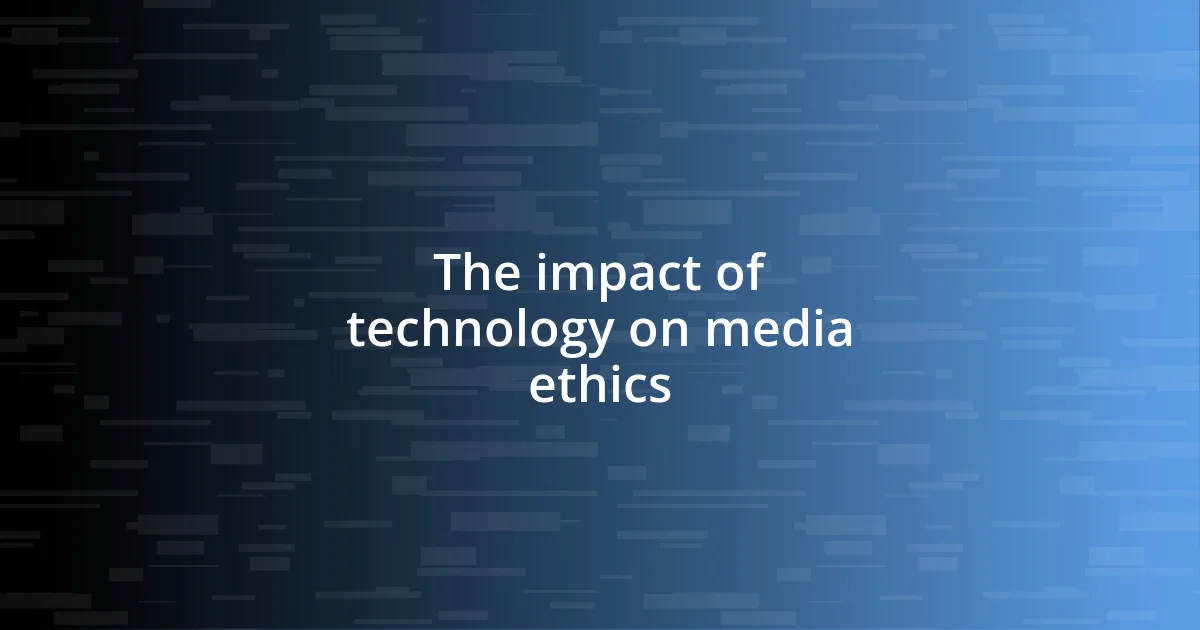
The impact of technology on media ethics
The rapid advancement of technology has significantly reshaped our understanding of media ethics. I recall attending a conference where a speaker highlighted the challenges of ensuring accuracy in information shared through algorithms. These algorithms can create echo chambers, reinforcing existing beliefs rather than presenting diverse perspectives. How does one uphold ethical standards when the very tools meant to disseminate information can distort the truth?
On a personal note, I’ve experienced the overwhelming speed at which news spreads through social media platforms. There was a moment when I shared an article that turned out to be misinformation—something I discovered only after my friends began discussing its validity. It made me realize the weight of my responsibility as a consumer and sharer of information. We must always vet sources, yet the ease of sharing can often lead to a careless attitude toward verification.
In addition, the dilemma of content monetization complicates ethical media practices. I often think about news outlets prioritizing sensationalism over substance to drive revenue. This constant tension between financial incentives and journalistic integrity urges me to advocate for transparency in how news is reported and funded. My hope is that as technology evolves, so too will our commitment to ethical standards within the media landscape.
| Factor | Technology’s Impact |
|---|---|
| Information Accuracy | Algorithms can perpetuate misinformation, making it hard to discern truth. |
| Speed of Dissemination | Rapid sharing on social media increases the risk of spreading unverified content. |
| Monetization of Content | The pressure to generate clicks can compromise journalistic integrity. |
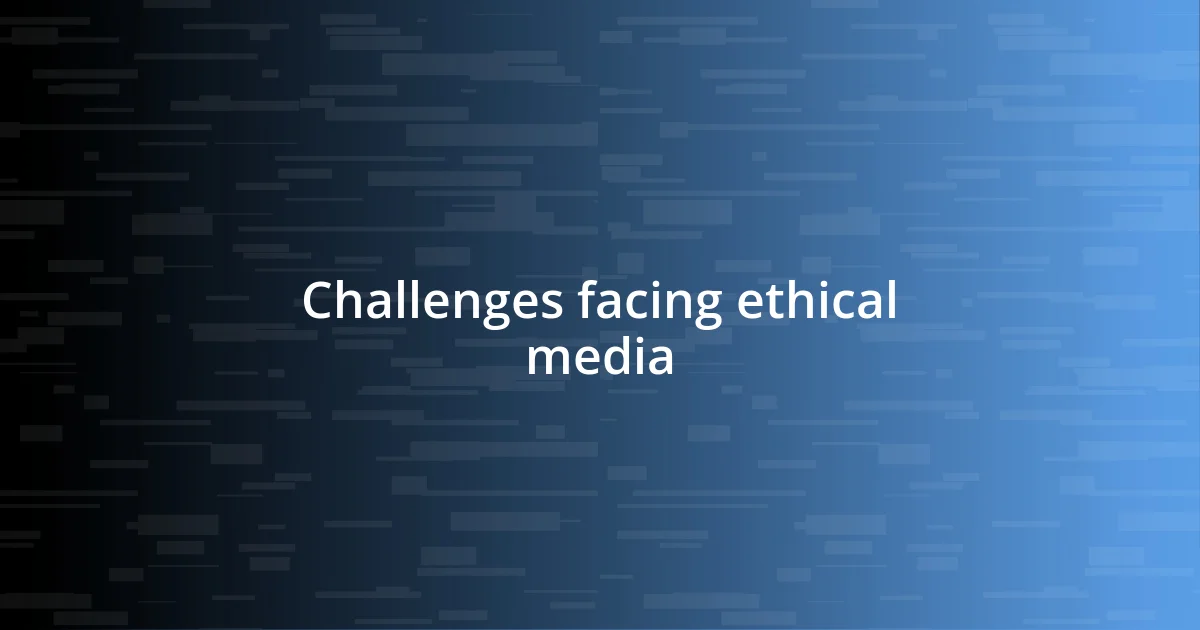
Challenges facing ethical media
Navigating the ethical challenges in media today feels like walking a tightrope; one misstep can lead to significant repercussions. I’ll never forget reading an article that sensationalized a tragic event, fueling rage rather than understanding. It struck me that many outlets seem to prioritize narrative over nuance, which can have dire consequences. This emphasizes the need for ethical reflection, especially when emotions run high.
Here are some key challenges I see facing ethical media today:
- Misinformation Spread: The speed at which false information travels is alarming, often outpacing corrections.
- Corporate Influence: Media outlets can be swayed by advertisers, compromising the integrity of unbiased reporting.
- Public Trust Erosion: A growing skepticism about media motives creates a divisive relationship between journalists and audiences.
It’s a constant battle, and I find myself questioning my own consumption habits. How often do we stop to consider the ethics behind our daily news?
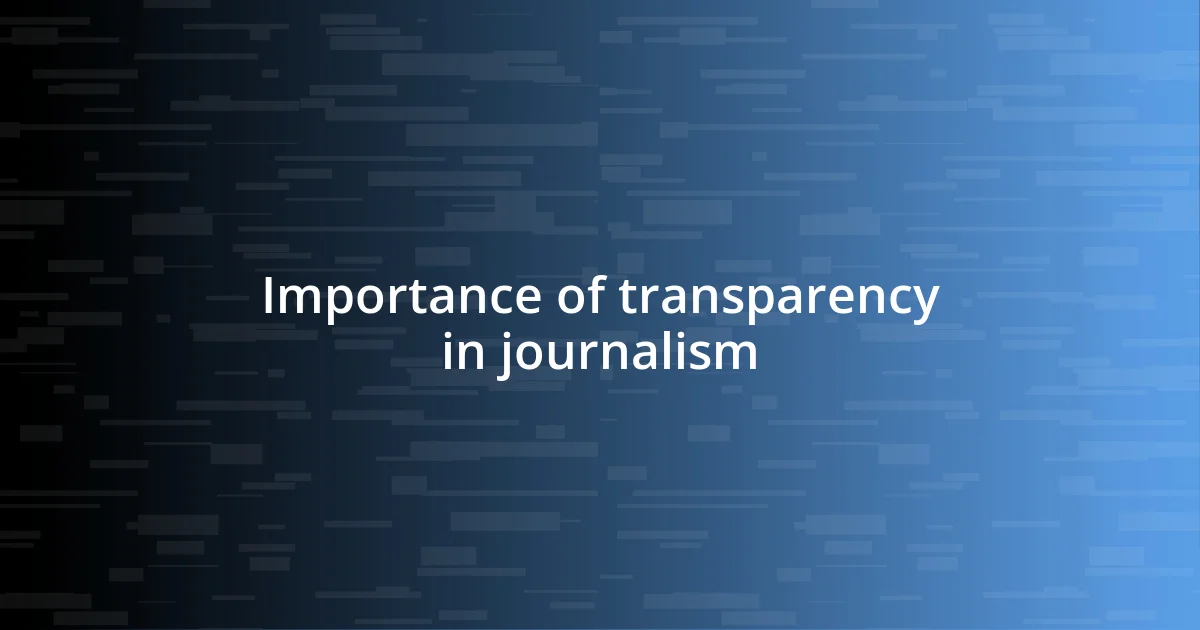
Importance of transparency in journalism
Transparency in journalism is crucial for maintaining the trust of the public. I vividly remember a time when a major news outlet broke a story that later turned out to be misleading. The fallout was immense, not only for the publication but also for the individuals involved. It left me pondering—how can we hold journalists accountable if the processes behind their reporting are opaque?
When journalists disclose their sources or the methods behind their stories, it fosters a culture of accountability. I’ve noticed that when I come across articles that explain how the information was gathered, I feel a stronger connection to the content. It reassures me that the journalist is committed to accuracy and integrity. Isn’t it comforting to know that the news you’re consuming is grounded in ethical practices?
Moreover, transparency also allows readers to engage more critically with the information presented. I find myself reflecting on how little people understand the intricacies of media production. When journalists share their challenges and dilemmas, it not only humanizes them but also invites readers to think deeper about the news they encounter. Isn’t it important for us to demand clarity and honesty in a world overflowing with noise?
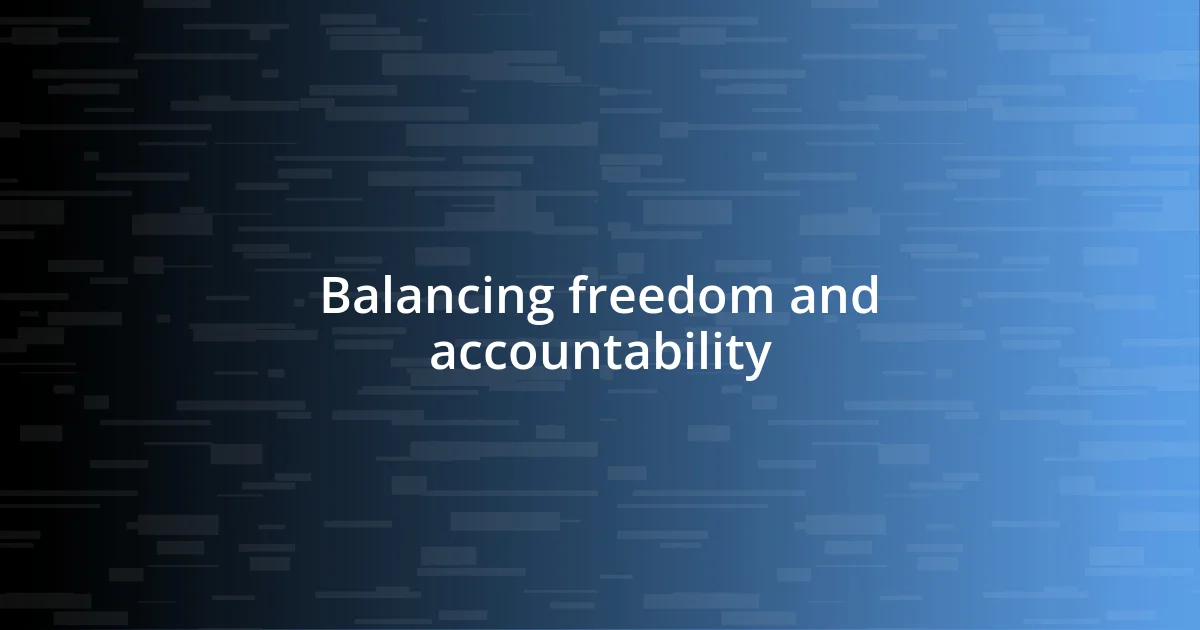
Balancing freedom and accountability
Balancing freedom and accountability in media can feel almost paradoxical. On one hand, journalists must exercise their freedom to report and comment on issues openly. However, I recall a time when a news outlet’s unchecked freedom led to a story that misrepresented a community. The backlash was swift and overwhelming, leaving me to wonder: how do we ensure that the press can speak freely while still being responsible in their choices?
I believe that accountability should be woven into the fabric of journalistic freedom. It’s not enough to just provide information; there must be a commitment to accuracy and ethics. For instance, I’ve seen firsthand how responsible reporting can shape public discourse. I remember following a local journalist who diligently corrected a misconception about a community event, fostering a dialogue that actually brought people together rather than driving them apart. It makes me think—shouldn’t every media outlet strive for this kind of accountability?
Ultimately, achieving this balance requires dialogue, not just within media organizations but also between journalists and the public. When I engage with media, I sometimes feel like I’m part of a larger conversation. Isn’t it our responsibility to question what we consume? By demanding transparency and holding media accountable, we can cultivate an environment where freedom of expression doesn’t come at the cost of truth and integrity.
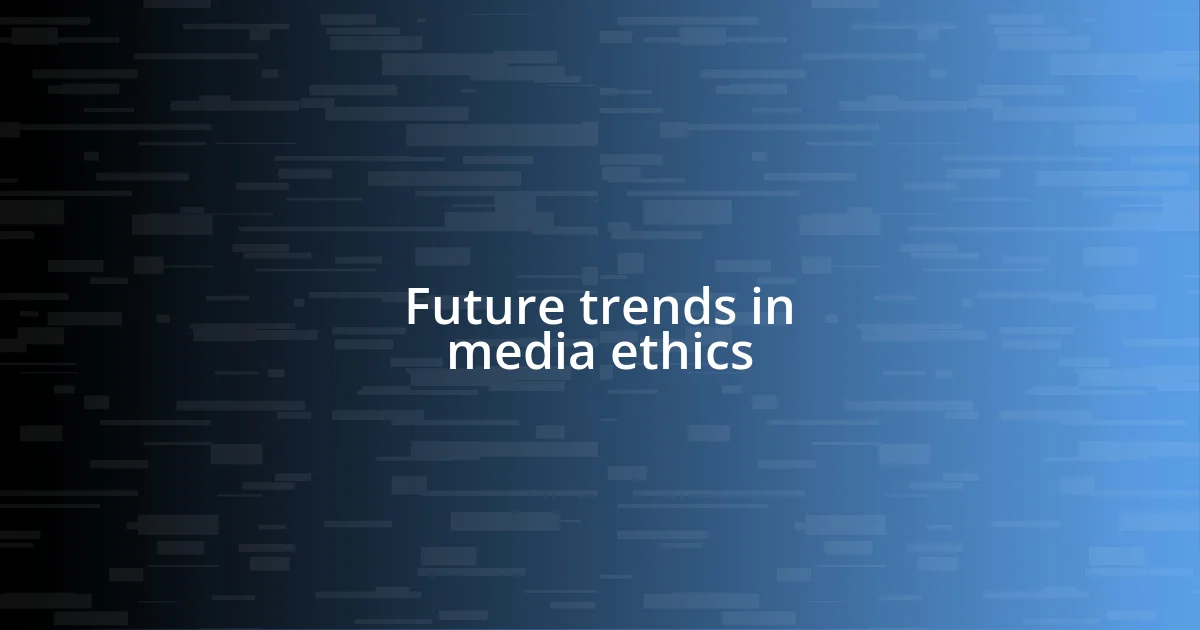
Future trends in media ethics
The future of media ethics is undeniably intertwined with technology. As algorithms and artificial intelligence continue to shape how we consume information, there’s a growing need for ethical guidelines surrounding their use. I remember a moment when a social media platform’s algorithm prioritized sensational content, creating a feedback loop of misinformation. It made me wonder—how can we as a society create boundaries that ensure these technologies serve the public good, rather than amplify the noise?
Another trend I foresee is the increasing emphasis on diversity and representation in media. I’ve seen firsthand how diverse perspectives can enrich storytelling, making narratives more relatable and comprehensive. I once read a feature article penned by a journalist from an underrepresented community, and it opened my eyes to so many dimensions I hadn’t considered. Isn’t it refreshing to think that as media evolves, it might reflect a broader array of voices and experiences?
Moreover, I suspect we’ll also witness a push against unethical partnerships and sponsorships in journalism. There’s a palpable discomfort I experience when I see a news outlet veering too close to corporate interests. I’ve during my research noticed a trend where audiences are increasingly scrutinizing who funds their favorite news sources. Shouldn’t every reader feel confident that the news they consume is free from conflicts of interest? The good news is that this scrutiny could pave the way for more integrity-focused reporting, reinforcing trust in the media landscape.
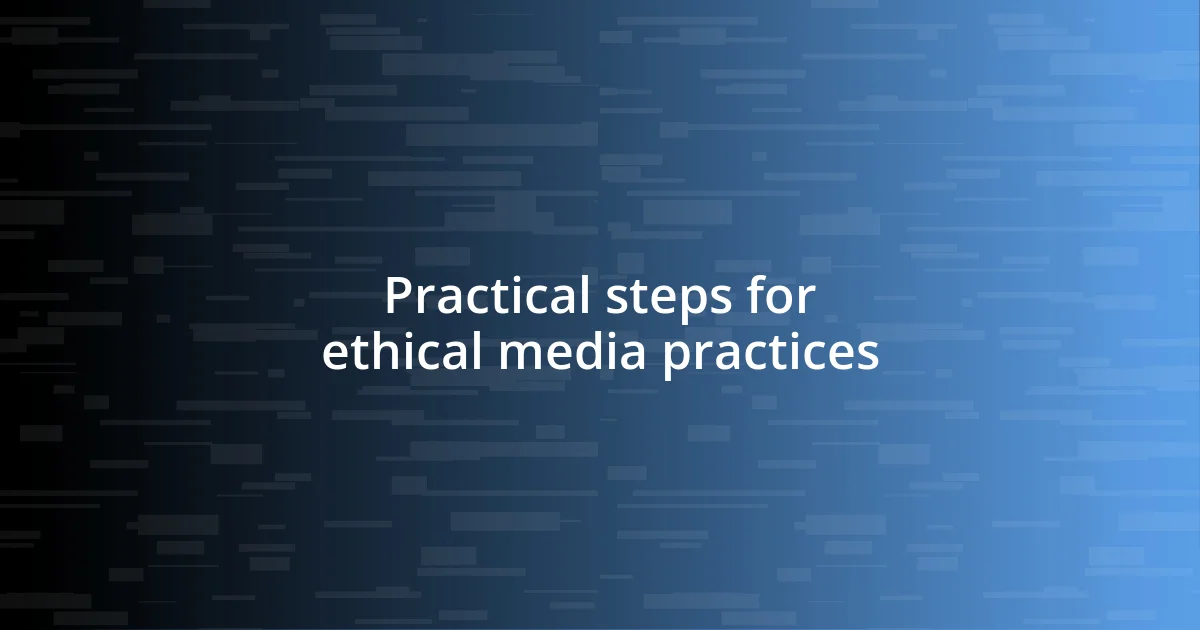
Practical steps for ethical media practices
Implementing ethical media practices hinges on transparency. I can’t stress enough how critical it is for journalists to clearly disclose their sources and methodologies. There was a time during an investigative project I followed where a lack of source attribution resulted in distrust from the audience. I remember thinking, how can the public trust what they don’t fully understand? This moment reinforced for me that when we share our processes openly, we not only inform the audience but also foster a culture of trust.
Another important step is fostering an environment where constructive criticism is welcomed. From my experience, engaging with feedback can significantly enhance the quality of reporting. I once participated in a workshop where journalists were encouraged to critique each other’s work—what a revelation that was! Instead of defensiveness, there was a sense of camaraderie. It made me realize that welcoming conversations about ethics and decision-making can lead to more responsible journalism and a deeper commitment to integrity.
Finally, continual education on media ethics is essential. I’ve often found myself reflecting on how quickly the media landscape changes; keeping up-to-date is a must. I vividly remember attending a seminar on ethical storytelling that opened my eyes to biases I had overlooked in my own reporting. If we want to embody ethical practices, we must embrace a lifelong commitment to learning. Doesn’t it feel empowering to know that every step we take toward education can strengthen our role in shaping a more ethical media culture?










